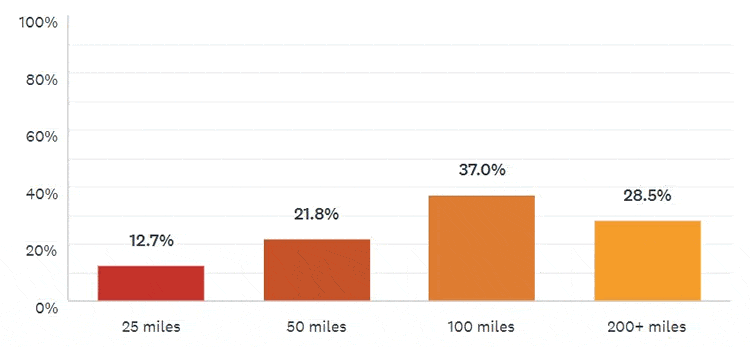Part
01
of one
Part
01
Recreational Land
Key Takeaways
- A survey by Landthink suggests that "37.0% of its audience would be willing to travel 100 miles to use their recreational property."
- Owners of recreational land opined that they don't mind driving "1.5 to 2 hours to get away from the hustle and bustle of daily life."
- 54% of Canadians are willing to travel up to 2 hours to a recreational property.
Introduction
We have provided the distance most owners are willing to travel to get to their recreational properties. The distance was provided in miles and hours. Additionally, we included surveys from outside the US, including Canada. A detailed overview has been provided below.
Acceptable Distance to Recreational Properties
- Distance is one of the primary factors considered when buying recreational land/properties. Reports suggest that prospective owners should spend less time journeying to the property than using the property. Additionally, the location should be "within driving distance of the home."
- Surveys indicate that buyers' opinions vary when it comes to traveling to their recreational properties. According to a study by Landthink, "37.0% of its audience indicated that they would be willing to travel 100 miles to use their recreational property."
- The report further stated that "28.5% of surveyed respondents are willing to drive 200 miles or more while 12.7% stated that they would only be willing to drive 25 miles."
- When probed further, "most owners of recreational land opined that they don't mind driving 1.5 to 2 hours to get away from the hustle and bustle of daily life."
- In Canada, retirees are the drivers behind the growth of the recreational property market.
- A RE/MAX recreational property survey opines that 54% of Canadians will travel up to 2 hours to a recreational property while 22% will travel 3 or more hours to a recreational property.
- RE/MAX further stated that 44% of Canadians are interested in proximity to town when purchasing a recreational property, and 35% focus on a reasonable distance from the primary residence.
- Industry experts also agree with little drive time from the primary residence. Jamie Spencer, broker/owner of Mossy Oak Properties Tennessee Land and Farm (TN), stated that "they sell lots of second homes, recreational, and hunting properties to folks living in Nashville, and the Tennessee area. Almost all clients are looking to keep themselves within a 1.5-hour drive from their primary residence."
Additional Information
- According to RE/MAX, 57% of markets offer properties below $500,000. The company also stated that about "44% of recreational property buyers are budgeting $200,000 to $500,000 in the next 12 months."
- The US Vacation Home Counties Report states that "the median income among borrowers who obtained mortgages for second homes in 2018 was over $100,000." Also, the approximated "income ratio to mortgage payments range from 4% to 12% in the vacation home counties."
Research Strategy
We scoured through industry reports, media, and news publications to determine the distance people are willing to travel from their homes to their recreational property. We were hoping to identify surveys, essays, and statements/interviews from industry experts on the acceptable distance by owners to their recreational property. Through this method, we identified most of the information needed. However, we were unable to focus on landowners that earn above $250,000 annually as data was not readily available on this demographic. Additionally, we included surveys from Canada to provide robust statistics. We thought to provide the income level of recreational property owners; however, this information is not readily available.
